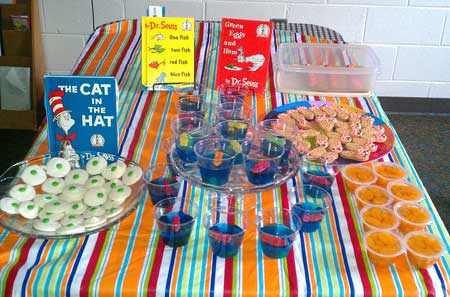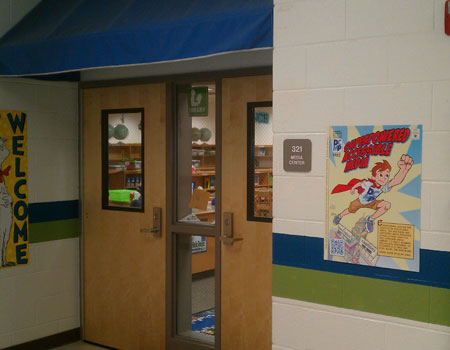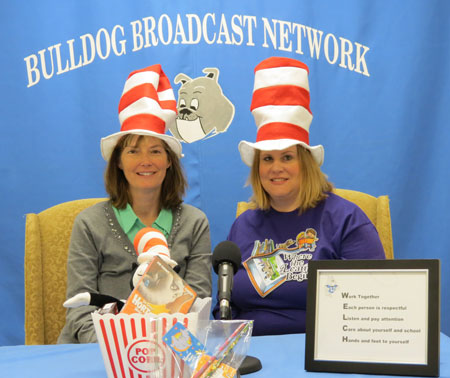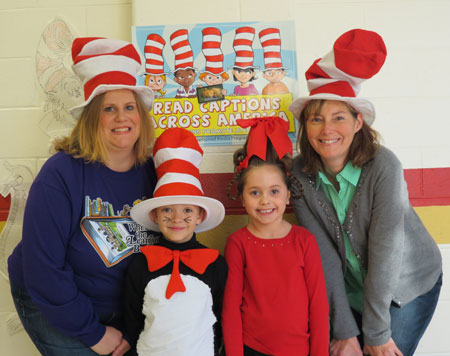RCAA Event Planning
Your celebration can be as simple or elaborate as time and inclination allow. Whether you choose to shoot for the stars or keep it simple, keep in mind the basic premise, and your event is almost certain to be a success!
The DCMP supports the NEA’s Read Across America by providing educators, parents, and caregivers with the resources they need to keep students reading throughout the year. For example, some DCMP media titles include online lesson guides, and the guides will help you plan a fun and exciting RCAA event.
Plan your event before you dive in head first!
Here’s a list of suggested preliminary steps to take before or as you begin your planning:
- Get your principal or superintendent’s approval to conduct an RCAA event.
- Check your school calendar and decide on a day to celebrate. Though Dr. Seuss’ birthday falls on March 2, you can schedule your event(s) on any day that is convenient for your school or organization. Remember: RCAA is a year-long celebration of better literacy through captioning!
- Read the NEA’s copyright and licensing arrangements regarding the use of content owned by Dr. Seuss Enterprises.
- Consult with your outreach staff, and encourage them to get other local schools involved.
- Inform other teachers about the event.
- Tell your students’ parents about the event.
- Gather support from local resources.
- Explore the Read Across America website fully.
- Get your Cat in the Hat hats and celebrate the big day!
Try some of these fun activities and ideas to make your event a success!
Once you’ve taken care of the preliminaries, add a splash of creativity to your RCAA event by building on some of the following suggested activities/resources:
- Invite a local author or celebrity to read from a book that a captioned media title is adapted from, or they may read from another book on a similar subject as the captioned media title that you are showing.
- Set up a round-robin viewing, with students moving from classroom to classroom, watching different short captioned media titles at each stop.
- After viewing a captioned media title, have students write the next chapter to the story.
- Ask the children to name their favorite media titles. Tabulate the results and post the list.
- Create a bulletin board of teachers’ and students’ favorite media titles for the classroom.
- Have students fill out Dr. Seuss birthday cards with the name of a media title they watched and the book it was adapted from. Put the cards up around the school to recognize students for their participation and/or mail them to the DCMP. The DCMP will send a thank-you letter.
- Invite a local captioning company to come and demonstrate how media is captioned.
- Add to your library’s collection by requesting new and used books that are available free of charge to schools for participating in “Read Across America” and other literacy programs. One such program, LEFBooks (LEF stands for the Literacy Empowerment Foundation), has distributed over 40,000 books to U.S. schools.
- Try reading captions across America by the mile. Assign each media title a value in miles, and let the students accumulate miles to “travel” across the United States. Mark their progress on a big map. Or read captions across America by having students watch media titles of stories that take place in each of the 50 states or non-fiction titles that highlight states or regions.
- Ask your cafeteria manager to create a special meal (such as green eggs and ham) or an RCAA birthday cake that displays “Happy Birthday Dr. Seuss!” A large poster listing the foods and which stories they are from brings the student’s interest back to the books and media titles.
- Plan a week of zany dress-up days to celebrate your reading theme (Fox in Socks Day, Kid in a Hat Day, Grinch Green Day, etc.). Organize a costume parade including both staff and students.
- Ask administrators to do something wacky if students reach a particular viewing goal before the RCAA celebration. Some principals have eaten worms, jumped in frozen lakes, dyed their hair purple, or even kissed pigs!
- Print and use the Read Across America Event Kit from Seussville.
- Award RCAA participants with a certificate of participation [PDF] and prizes at the end of your celebration.
- Forward RCAA information and resources to other teachers and outreach personnel.
- Order the media you plan to use for your event well in advance! We’ve put together some suggestions of DCMP media for your RCAA event, but feel free to browse or search the DCMP catalog to create your own customized list.
- Update your bulletin board and website or blog with pictures of students and staff taking part in RCAA-related activities. Share these pictures on the Read Captions Across America Flickr group (if you don’t have a free Flickr account and don’t wish to sign up for one, you can e-mail your pictures to the DCMP, and we’ll post them for you).
- Don’t forget to e-mail the DCMP at info@dcmp.org to pledge your event.
- For more ideas on planning a RCAA event, see the NEA’s “Read Across America” website.
Make a bigger impact by involving your community!
Here is a list of ways that you can help us make this annual event a success from the start!
- Get others in your community involved. Contact local celebrities, sports teams, politicians, and authors, and invite them to take part in your event and activities.
- Contact teachers and administrators at other local schools or organizations that are staging Read Across America activities and tell them about RCAA. Offer tips on how to include captioned media in their own Read Across America events. If you have the resources and time to do so, offer to stop in and host the event yourself!
- Generate a story about the event on your local television news or in your local newspaper. The NEA has posted a great list of PR tools for Read Across America that you may want to take a look at before making contacts. The DCMP has a press release to announce RCAA.
- Distribute DCMP flyers to teachers, librarians, special education coordinators, and school administrators.
- Include an article about the events you are planning in your school’s newspaper or newsletter to parents.
- Join the RCAA Flickr group and use the photos there to promote your RCAA event on your website or blog.
- Promote your RCAA event on your organization’s Facebook, MySpace, or other social-networking profile. Utilize a free event promotion service like Eventful.com to spread the word!
- Place the RCAA posters and flyers in prominent, high-traffic areas in schools, libraries, or other locations where Read Across America events are to be held. To download or order the poster, please visit the DCMP website.
- Send a link to everyone in your network, school, and listservs. Do a search for other organizations or education representatives that you can send this information to as well.
Hosting A Read Captions Across America Event
Learn about one parent’s event planning in Newnan, Georgia.
Each year during the first week of March, the birthday of Dr. Seuss is celebrated in schools across the country in a National Education Association Read Across America event. The Described and Captioned Media Program (DCMP) has launched a brilliant version of the event called Read Captions Across America to promote media literacy via captioning. Springboarding from this theme, I approached the Library Media Specialist at my son's elementary school about hosting a similar event. She enthusiastically agreed. Permissions were granted from the principals, and the planning began for our event at Welch Elementary in Newnan, Georgia.

Dr. Seuss-themed treats in a classroom
As a parent of two deaf/hard of hearing (d/hh) college- and high-school age students and one elementary-age hearing student, I recognize the benefits of captioning for all students. Prior to moving to Georgia, I worked as an Educational Captionist in a school district that had a large student body that was deaf/hard of hearing. While there, I facilitated an RCAA event for our neighborhood elementary school. I am grateful for all that captioning has done and continues to do for my family in providing a bridge to a world of information and feel that it is a responsibility and privilege to spread the word to families of children with and without hearing loss. For me, being an accessibility advocate is a role, whether paid or voluntary, that I take seriously and choose to fulfill enthusiastically.
At Welch, a school serving around 870 students, some of which are d/hh or blind/low-vision, I saw a wonderful opportunity to introduce the idea of using captioned media as an educational tool in the classroom and at home.
In late February, I wrote a letter to parents extoling the benefits of captioned media from research done by fellow Dr. Carl Jensema. Improved reading and listening comprehension, enhanced word recognition and decoding of words, assistance in acquiring new vocabulary, reinforcement of spelling and grammar, and overall enjoyment in reading are a few of the many benefits of utilizing captioned media with students. Directions for how to activate captions on television and DVDs were included. A similar letter was written to school staff to get everyone on board with the advantages of utilizing accessible media for all students in the classroom.
The DCMP sent posters with three different themes advertising the event to be placed around the school. They also provided bookmarks for each student and certificates for classroom participation.

Welch Elementary Library entrance with one of the newly designed DCMP posters
On March 1, we sent a broadcast segment throughout the school describing captions and how to turn television time into reading time. The students then watched an accessible version of The Lorax that had been provided by the DCMP. In the parent letter, each student was challenged to watch captioned media at home and turn in a raffle ticket to be entered into a drawing for prizes. The classes with the most participation received a cupcake party and individual winners received prizes that included a Cat in the Hat plush toy, The Lorax DVD with accessibility features, and popcorn and movie candy for a family movie night.

Jennifer Beard (Library Media Specialist) and I kicking off our event on RCAA Day from the Welch Elementary Bulldog Broadcast Network.
The project exceeded my expectations. Prior to the event, very few classrooms had their captions activated or were watching DVDs with subtitles. Post event, most classrooms have the accessibility features activated. The project seems to have raised awareness about the many benefits of utilizing accessible media at home and at school with parents, students, and staff for both d/hh and hearing; sighted or blind/low-vision. It has provided positive experiences with accessible media that can be continued at home. Visual reminders remain throughout the school in posters and certificates proudly displayed by teachers. My favorite raffle ticket comment came from a 3rd grader: "I love captioned reading! I think it is very important to some people! Thanks for doing Read Captions Across America for Welch! Love, Leah." Time well spent.

Jennifer Beard (Library Media Specialist), Kevin Banks, Harper Powell, Michelle Rich in front of the newly designed RCAA poster
Look at these ideas from Michelle Rich, parent of a 5th grader at Welch Elementary School in Newman Georgia:
Script for Video Shown to Students [.docx]
RCAA Parent Flyer [.docx]
RCAA Captioning Information for Teachers/Parents [.docx]
Comments from hearing children who watched captioning at home:
- "I love captioned reading! I think it is very important to some people! Thanks for doing Read Captions Across America for Welch!" —Love, Leah, 3rd grade
- "We had it on all weekend." —Grant, 3rd grade
- "I watched Rio." —Devante, 5th grade
- "It was fun and easy." —Morgan, 4th grade
- "I loved them all." —Jesslyn, 4th grade
- "I think it helped me with my education." —Thomas, 4th grade
- "I really like having the captioning on. I saw words that I did not know until I saw them on the captioning." —Abby, 2nd grade
- "I watched Mythbusters." —Alejandro, 5th grade
- "Great activity." —Jonah, 1st grade
- "Our family watches a lot of foreign movies in captions." —Hunter, 3rd grade
- "I liked it but sees [since] I don't yousely [usually] watch it but I liked it. It also helped me with the reading." —Emmaline, 4th grade
- "It was very different." —Lela, 4th grade
- "It was fun and easy." —Josiah, 2nd grade
- "I like reading captions. It was fun. I would like to do it again sometime." —Hayllie, 1st grade
- "The closed caption of our TV has been on since Kent began watching TV." —Kent, 1st grade
- "Watching my shows with captioning helps me learn new words and also lets me hear the words that I may not have been able to pronounce or know." —Kaela, 5th grade